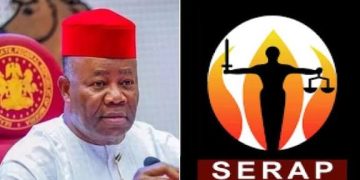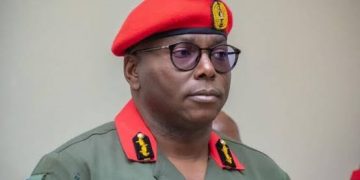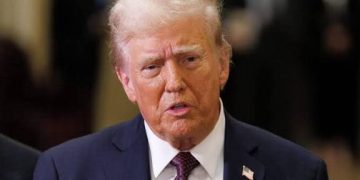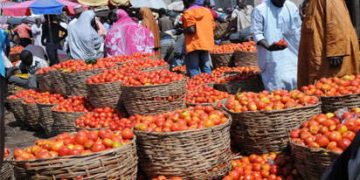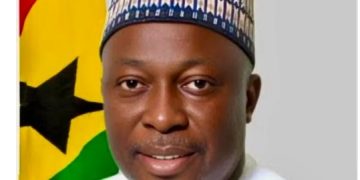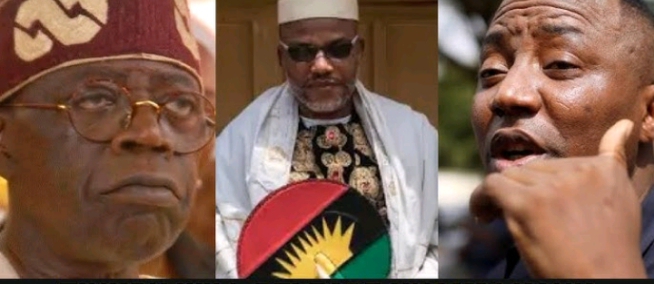The question is not whether protests are allowed, but whether a democratic government can credibly justify suppressing one that insists on remaining peaceful.
When a government moves to suppress a protest, even one expressly declared to be peaceful, it raises urgent questions about the balance between security, political interests, and constitutional freedoms.
In Nigeria today, as pressure mounts over the continued detention of Nnamdi Kanu despite appellate court rulings in his favor, the Tinubu administration’s efforts to block peaceful demonstrations have drawn sharp criticism at home and abroad.
This is not merely a domestic dispute; it is a test of Nigeria’s democratic credentials, its human rights record, and its respect for the rule of law. The international community and media must watch closely.
Nnamdi Kanu, leader of the Indigenous People of Biafra (IPOB), remains in detention on terrorism-related charges. Yet, in 2022, Nigeria’s Court of Appeal discharged and acquitted him on several counts. Despite this ruling, the Federal Government has refused to release him, insisting on pursuing further legal action.
Critics argue that this defiance undermines judicial authority and due process. Activist Omoyele Sowore and other civic leaders have framed the current protest movement not as an act of rebellion, but as a call for constitutional compliance and respect for judicial decisions.
The planned protests are being organized under the banner of peaceful civic expression a right guaranteed by Sections 39 and 40 of Nigeria’s Constitution. In any functioning democracy, peaceful dissent is not only permitted but protected.
A protest becomes unlawful only when participants engage in violence, destruction of property, or obstruction of lawful activity. Yet, authorities appear intent on labeling this one a threat before it begins.
From available reports and the prevailing political climate, several factors seem to be driving the administration’s determination to suppress the protest:
The government likely fears that a large-scale demonstration centered on Kanu’s detention could become a powerful symbol of opposition and mobilization. Such visibility could amplify dissent, attract international media coverage, and expose perceived inconsistencies in governance and justice.
Authorities frequently cite “national security” and “public order” to justify restrictions on protests. The police have obtained court orders prohibiting demonstrations near sensitive areas such as Aso Rock, the National Assembly, and the Court of Appeal.
While official statements warn against carrying weapons or inciting violence, critics view these restrictions as a pretext to preempt civic mobilization rather than to preserve peace.
Government lawyers have reportedly sought injunctions to restrain Sowore and other organizers from leading or participating in protests. Even when courts uphold the right to demonstrate, “conditional” rulings such as limiting locations give security agencies broad discretion to arrest protesters who step outside designated areas.
Kanu’s detention resonates deeply in Nigeria’s South-East, where it has become a symbol of political exclusion and regional grievance. Heavy-handed suppression of peaceful protest risks reigniting separatist sentiment and further alienating citizens who already feel marginalized.
Allowing a major protest to proceed successfully could embolden future movements. For an administration already confronting economic hardship, insecurity, and discontent, preventing momentum for mass mobilization may be seen as politically essential.
Thus, while protesters insist their movement is peaceful and lawful, the state perceives multiple overlapping threats, symbolic, political, security-related, and reputational, and has moved swiftly to contain them; sometimes, allowing nature to take its natural course is essential.
At the heart of the standoff lies a conflict between two legally grounded claims:
The protesters’ claim: that constitutional rights to peaceful assembly cannot be abridged without clear and compelling justification, and that any injunctions purportedly obtained by the police are expired, improperly served, or invalid.
The government’s claim: that interim court orders restricting protests in “sensitive zones” are legitimate, and that preventing disorder is a lawful exercise of state power.
A Federal High Court recently ruled that protests may proceed generally, but not within specific restricted areas. The police, while pledging to obey the order, have urged organizers to do the same.
This hybrid ruling preserves the precarious balance between principle and practice a government permitting protest in theory while curtailing its reach in reality.
Any excessive use of force or unlawful arrest during a peaceful protest could invite condemnation from international bodies such as the United Nations, ECOWAS, and the African Commission on Human and Peoples’ Rights. Nigeria’s reputation as Africa’s biggest democracy would be at stake.
Suppressing peaceful dissent often erodes public confidence in government and risks radicalizing the opposition. In a country already struggling with polarization and insecurity, such repression could prove counterproductive.
Ignoring or undermining appellate rulings weakens judicial independence and fuels perceptions of executive overreach damaging one of the cornerstones of democracy.
Social media, diaspora activism, and global journalism will amplify every action and reaction. Nigeria’s information space, once dominated by official narratives, is now a contest of truth and legitimacy.
The tension between law enforcement and lawful protest has defined many moments in Nigeria’s modern history. Yet this moment feels especially consequential.
Will the police act with restraint?
Will the government heed its own courts?
And will Nigeria emerge from this episode as a democracy strengthened by its tolerance or weakened by its fear?
The world should be watching what unfolds in Abuja not just as a protest, but as a defining measure of Nigeria’s democratic maturity.
Daniel Okonkwo is a seasoned writer, human rights advocate, and public affairs analyst, renowned for his thought-provoking articles on governance, justice, and social equity. Through his platform, Profiles International Human Rights Advocate, he consistently sheds light on pressing issues affecting Nigeria and beyond, amplifying voices that call for accountability and reform. He is also a professional transcriptionist and experienced petition writer, with over 1,000 published articles to his credit on Google. Many of his works have been featured in Sahara Reporters and other major news outlets. In addition, he works as a ghostwriter, freelancer, and journalist.


